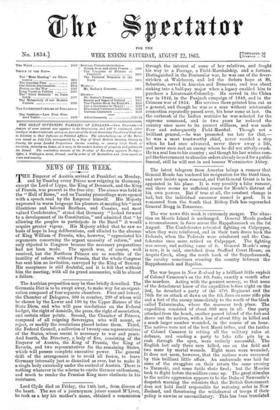Lord Clyde died on Friday, the 14th inst., from disease
of the heart. The son of a journeyman joiner named M'Liver, he took as a boy his mother's name, obtained a commission through the interest of some of her relatives, and fought his way to a Peerage, a Field-Marshalship, and a fortune. Distinguished in the Peninsular war, he was one of the fever- stricken at Walcheren, and led the forlorn hope at St. Sebastian, served in America and Demerara, and was about sinking into a half-pay major when a legacy enabled him to purchase a Lieutenant-Colonelcy. He served in the China war in 1842, in the Punjaub campaign of 1849, and in the Crimean war of 1854. His services there pointed him out as a general, and though he was as a man without aristocratic connection repeatedly passed over, his hour came at last. On the outbreak of the Indian mutinies he was selected for the supreme command, and in two years he reduced the country once more to its present stillness, and was made Peer and subsequently Field-Marshal. Though not a brilliant general,—he was promoted too late for that,— he was a most trustworthy chief, never receded a step when he had once advanced, never threw away a life, and never once met an enemy whom he did not utterly crush. He is a real loss to his country ; and though his last wishes cm- pel the Government to abandon orders already issued for a public, funeral, still he will rest in and honour Westminster Abbey.






























